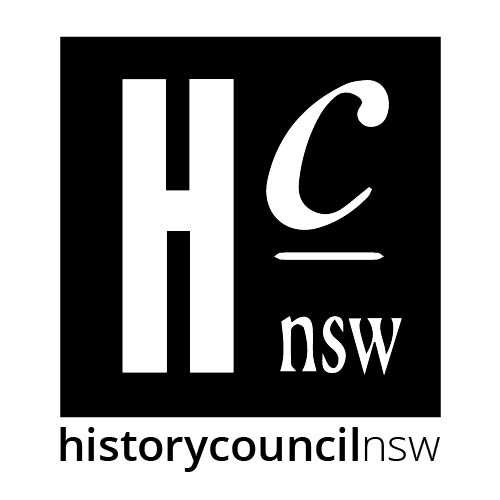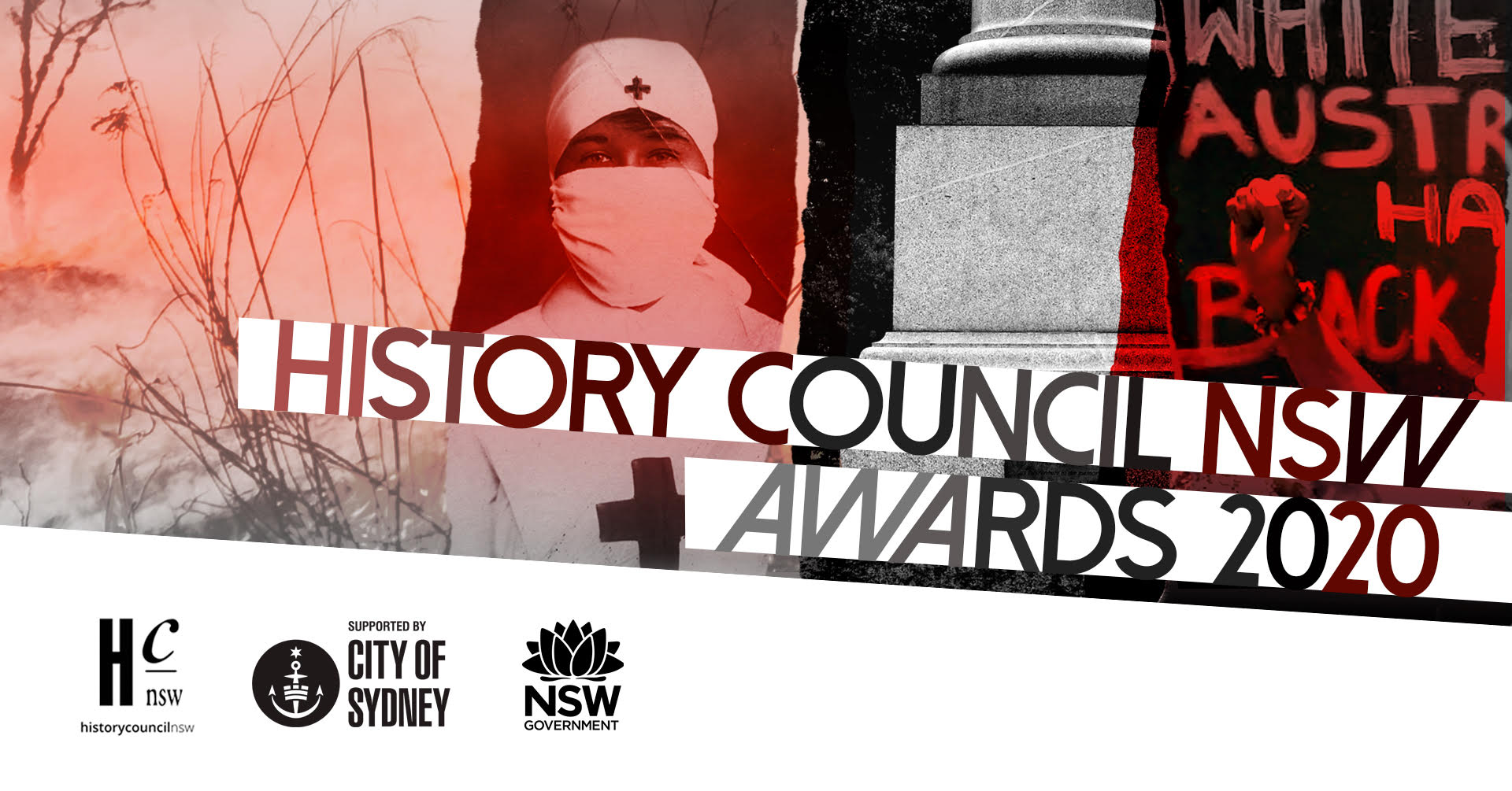
Awards and Prizes
Submissions for the 2021 Awards and Prizes will re-open in April/May 2021.
The HCNSW Awards & Prizes celebrates history in all its diverse forms.
From the history makers and it thinkers to collective memory and multicultural history, our Awards & Prizes in support and acknowledge contributions towards historical practice and theory, through exploring the past to engage and inform the memories and historical narrative of our present and future communities.
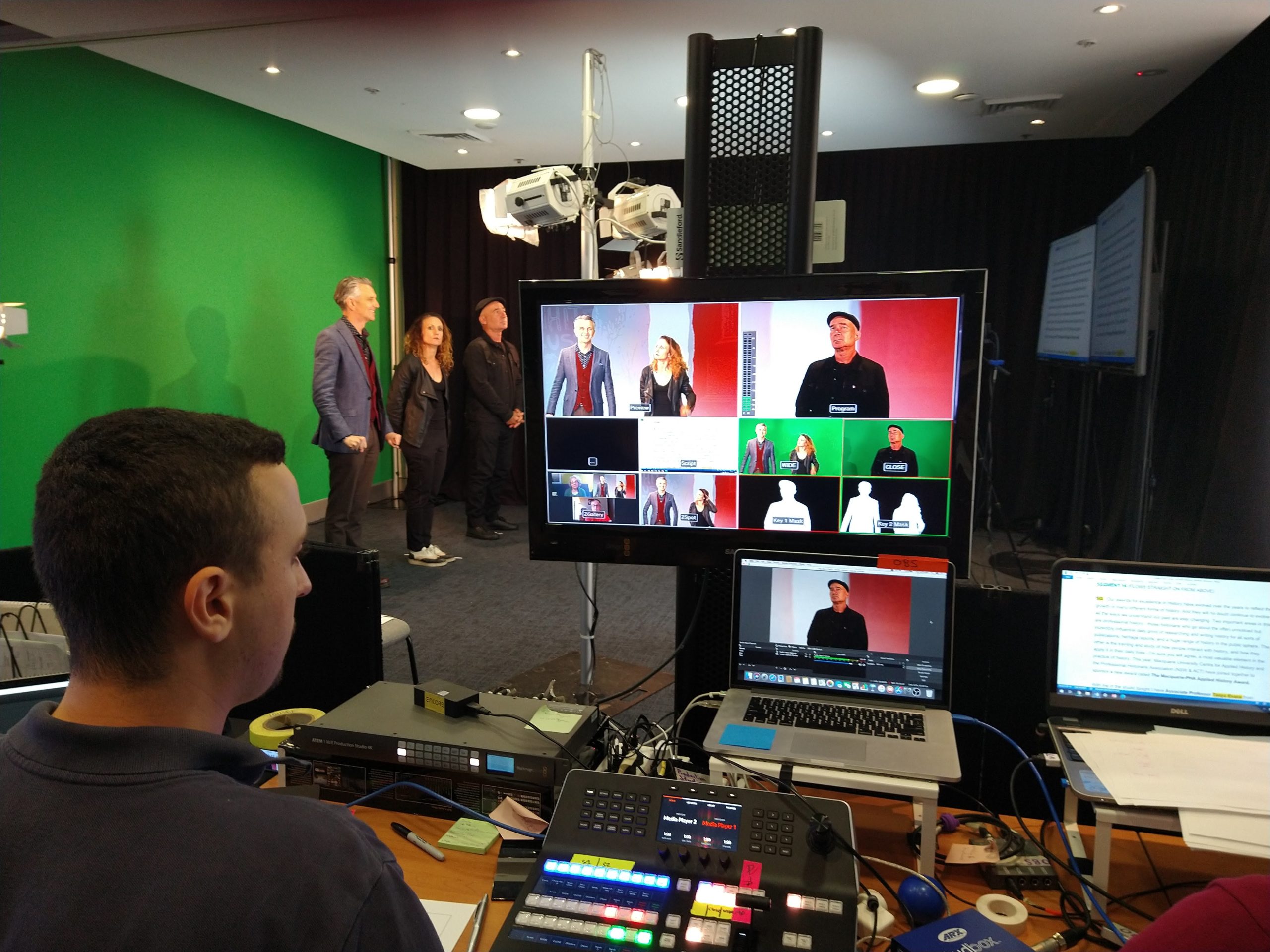
HCNSW Awards 2020 – Studio recording. Photo credit: Catherine Shirley
2020 Awards & Prizes Ceremony – available online
The HCNSW Awards 2020 was announced online on 6 November 2020.
This online ceremony was recorded and is available to watch any time and anywhere on the HCNSW YouTube channel. To watch our 2020 HCNSW Awards ceremony, access it via the button below, which will take you directly to our YouTube channel.
About the HCNSW’s Annual Awards & Prizes
Our awards and prizes foster excellence in Australian historical writing, showcase and reward best practice, and advance and promote public understanding and appreciation of history.
We offer a number of prestigious annual awards and prizes totalling $4,500 in prize money. Winners will be announced and presentations made in November 2021 (date to be announced).
The History Council of NSW also supports Create NSW in its administration of the NSW Premier’s History Awards and Fellowships in partnership with the State Library of NSW. This event, which traditionally signals the start of History Week each year, will be held at the State Library of NSW on Friday 3 September 2021.
HCNSW Awards & Prizes submissions will re-open in April/May 2021. Further details such as the criteria for each award and prize can be found below.
Click on the relevant tabs below to navigate to each award and prize.
- Addison Road Community Organisation Award for Multicultural History
- Aboriginal History Award
- Max Kelly Award
- The Macquarie-PHA Applied History Award
The Addison Road Community Organisation Award for Multicultural History was awarded for the first time in 2019. (winning entry is available to read via the link below from 2019)
The purpose of the Award is to encourage new and emerging historians to discover, analyse and explore multicultural histories and the history of multiculturalism in Australia, helping to increase academic and public engagement in a topic that has ongoing relevance to Australian history and society today.
The winner receives a citation and a prize of $500. The winning entry (essay or multimedia) makes an original argument using primary historical sources and demonstrate the capacity to develop complex arguments linking the past to contemporary, multicultural issues that have, or are currently impacting on the Australian community.
Co-authored or collaborative works are eligible for submission.
Opening date: To be confirmed – April/May 2021.
Submissions will be processed online.
Previous winners –
- 2020 Addison Road Community Centre Organisation Award for Multicultural History was awarded to Dr Alexandra Dellios for her entry: ‘Unsettling Post-War Settlement: Remembering Unassimilable Families in the Space of the Migrant Camp’.
- 2019 Addison Road Community Centre Organisation Award for Multicultural History was awarded to Charlotte Ward for her entry: ‘Captain Cook: A Catalyst for Contestation’.
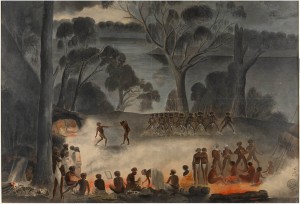
Corroboree on the Murray River, 1858, image by Gerard Krefft, courtesy SLNSW
The Aboriginal History Award was first awarded in 2016, the gift of an anonymous donor. Its purpose is to encourage students and other beginning historians (up to post-doctoral career) in the writing of Australian Aboriginal history, including Torres Strait Islander history, from original sources. Indigenous Australians are strongly encouraged to enter.
The winner receives a $1,500 cash prize, with the winning entry demonstrating excellence in addressing its subject, proficiency in the use of original materials and clarity of exposition.
Opening date: To be confirmed – April/May 2021.
Submissions will be processed online.
Previous Winners
- 2020 Aboriginal History Prize was awarded to Sally Bourkarim-Ghattas for her entry: ‘Black Power, Aboriginal Genocide, and the Politics of Identity’
- 2019 Aboriginal History Prize was awarded to Deirdre O’Connell for her entry: ‘American Boomerang: Searching Aboriginal Sydney, 1928’
- 2018 Aboriginal History Prize was awarded to Meg Foster for her essay: ‘The Forgotten War of 1900: Jimmy Governor & the Aboriginal People of Wollar.’
- 2017 Aboriginal History Prize was awarded to Ruby Arrowsmith-Todd for her essay: ‘Spectacle, Spectators and Critics: Mid-century Indigenous cinema-goers and Shell’s travelling films’.
- 2016 Aboriginal History Prize was awarded to Rachael Simons for her essay: ‘“We Will Protect Ourselves”: William Ferguson’s Critique of the Policy of Aboriginal Protection in NSW, 1937-1938’.
The Max Kelly Award of $500 is given annually to a ‘beginning’ historian for a work of excellence in any aspect of Australian history. The Award was established as a tribute to Associate Professor Maxwell John Kelly (1935-1996), the first elected President of the History Council, who died suddenly in 1996.
The History Council of NSW was grateful to Geoffrey Jones for his continuing support and generous donation of the prize money for the 2020 Max Kelly Prize.
Opening date: To be confirmed – April/May 2021.
Submissions will be processed online.
Previous Winners –
- 2020 Max Kelly Award was awarded to Elizabeth Heffernan for her entry: ‘‘Oh for places – green oases – ’: Australian Soldiers and the Environments of the First World War’.
- 2019 Max Kelly Award was awarded to Robert Mason for his entry: ‘The (First) “Battle of the Wasser”, 2 April 1915: A Footnote in History?’
- 2018 Max Kelly Medal was awarded to Jessica Urwin for her entry: ‘Physicists in the Fields of Thunder: Ernest Titterton and Britian’s Empire in the 1950’s Australia.’
- 2017 Max Kelly Medal was awarded to Marian Lorrison for her entry ‘Reduced to the Lowest Pitch of Want and Starvation’
- 2016 Max Kelly Medal was awarded to Daniel McKay for his entry: ‘Loyal Children: The Australian Factor in the Birth of the Imperial Federation Movement’.
- 2015 Max Kelly Medal was awarded to Rohan Howitt for his entry: “The Making of a Maori Working Class: Trans-Tasman Migration and Colonial Development in New South Wales, 1806-40″.
- 2014 Max Kelly Medal was awarded to Sydney-Clare Abba for her entry: “In History’s Page: A Comparative Historiography of the ‘Stolen Generations’ and the ‘Forgotten Australians’ Or A Study on the Need for Further Study”.
- 2013 Max Kelly Medal was awarded to Harriet Mercer for her entry ”The Responsibility that rests on our shoulders’: Ideas of Race, Gender and Citizenship in Interwar Australian Feminist Activism’.
- 2012 Max Kelly Medal was awarded to Haidee Ireland for her entry: ‘The case of Agnes J.: Tracing Aboriginal presence in Sydney through criminal Justice records’.
- 2011 Max Kelly Medal was awarded to Rose Cullen for her entry: ‘Empire, Indian indentured labour and the colony: the origins of the debate over ‘coolie’ labour 1836-37’.
- 2010 Max Kelly Medal was awarded to Agnieszka Sobocinska for her entry: ‘The language of scars’: POWs’ bodies and the overturning of the colonial order’.
- 2009 Max Kelly Medal was awarded to Isobelle Barrett Meyering for her entry: ‘Abolitionism, settler violence and the case against corporal punishment: A reassessment of Sir William Molesworth’s contribution to the transportation debate’.
- 2008 Max Kelly Medal was awarded to Grant Mansfield for his entry: ‘The Costs of War: patriotism and price-fixing during the opening months of the Great War in Australia’.
- 2007 Max Kelly Medal was awarded to Timothy David Castle for his entry: ‘Watching Them Hang: Capital Punishment and Public Support in Colonial New South Wales, 1826-1836′.
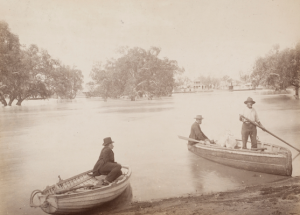
Darling and lower Murray during the flood of 1886, Image courtesy State Library of NSW
Macquarie University Centre for Applied History and the Professional Historians Association (NSW & ACT) are joint sponsors of The Macquarie-PHA Applied History Award.
The purpose of the Award is to encourage historians to produce a creative work of applied history drawing on their research. It aims to promote the value of public history and the pursuit of history as a rewarding professional career.
Individuals and groups are eligible to apply. The award is open to historians at all stages of their career, including those inside and outside of academic institutions; undergraduate, diploma, masters and doctoral level students; as well as professional, local, community and family historians. Candidates must have lived and/or created their work in New South Wales or the Australian Capital Territory over the 12 months preceding the deadline for submissions.
The winner receives a citation and a prize of $1,000. The winning entry will demonstrate excellence in writing or other media, and the ability to use original source materials, or demonstrated originality of interpreting the past in a contextual way. This work should engage with the field and practice of professional, public and applied history, using the past to inform contemporary concerns, issues and topics in creative ways.
Winner –
- 2020 The Macquarie-PHA Applied History Award was awarded to Martha Ansara and Robynne Murphy for their entry: “Women of Steel”
For 2019, the subject for the Centre of Applied History Award was for works in applied and public history that have the potential to inform good public policy. Co-authored or collaborative works were eligible for submission.
- 2019 Macquarie University Centre for Applied History Award was awarded to Kieran Bonin for his entry: ‘Rugby in Union?’
(Please note that the above link leads through to an abstract containing a link to the Podcast that formed part of the entry)
Previous Winners of the Applied History Award (previously known as the Deen De Bortoli Award for Applied History) are:
- 2018 Deen De Bortoli Award for Applied History was awarded to Dr Peter Prince for his entry: ‘Australia’s most inhumane mass deportation abuse? Robtelmes v Brenan and explusion of the Alien Islanders.’
- 2017 Deen De Bortoli Award for Applied History was awarded to Jodie Stewart for her entry: ‘Emotions, Stories, Pasts: Feeling the Settler and Aboriginal Past on the Bundian Way’.
- 2016 Deen De Bortoli Award for Applied History was awarded to Dr Hannah Forsyth for her entry: ‘Dreaming of Higher Education’.
- 2015 Deen De Bortoli Award for Applied History was awarded to Meg Foster for her entry: ‘Online and Plugged In?: Public History and Historians in the Digital Age’.
Opening date: To be confirmed – April/May 2021.
Submissions will be processed online.
If you have any questions please contact us and subscribe to our e-newsletter to receive announcements.
In 2020, the Awards & Prizes ceremony was produced in a new and exciting digital format with the support of a Cultural Sector Resilience Grant from the City of Sydney.

2020 Awards & Prizes Winners
2020 Max Kelly Award Winner – Elizabeth Heffernan
for her essay on ‘‘Oh for places – green oases – ’: Australian Soldiers and the Environments of the First World War’.
The purpose of this essay is to examine the ways in which Australian soldier diarists of the First World War wrote about—and as such thought about, interacted with, placed value upon—their wartime environments. Specifically, it seeks to analyse how Australian soldiers understood the role of nature within the war itself, and how this influenced their post-war attitudes towards the Australian environment.
Edited chapter from her Bachelor of Arts Honours thesis, Department of History, University of Sydney, researched and written throughout both Semester 1 and Semester 2 of 2019, under the supervision of Associate Professor Frances Clarke.

2020 The Addison Road Community Organisation Award for Multicultural History Winner – Dr Alexandra Dellios
for her essay ‘Unsettling Post-War Settlement: Remembering Unassimilable Families in the Space of the Migrant Camp’. Post-WWII migrant camps were unsettling spaces for newly arrived families in postwar Australia.
Hundreds of thousands of assisted migrants and refugees passed through these camps, established from 1947 and progressively shut down from the late 1950s.
This essay analyses memories of migrant camps by mothers, sons and daughters. They have grappled with contentious and contradictory family histories and the ongoing legacies of being ‘received’ and temporarily housed in a place of containment and control.
The place features prominently in the meaning-making practices of child migrants grappling with unsettled and unsettling family histories.
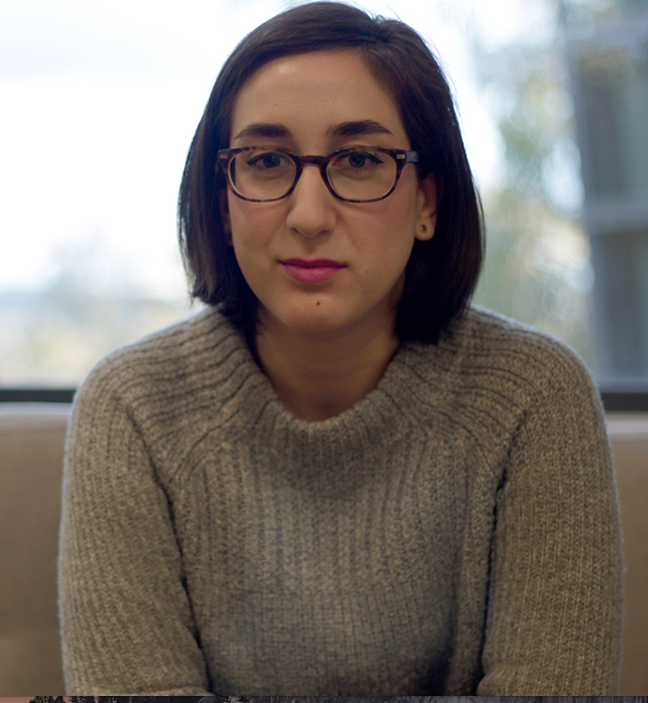
2020 The Aboriginal History Award Winner – Sally Bourkarim-Ghattas
for her essay ‘Black Power, Aboriginal Genocide, and the Politics of Identity’. In 1970, five Indigenous Australians petitioned the UN, charging the Australian Government with “genocide.” Drawing on archival material from the Office of Aboriginal Affairs and ASIO, she examined how these historical agents conceived of “genocide,” and why it was employed at this historical moment. Taking William Sewell’s notion of discursive “slippage,” this paper argues that the AAL’s claim to genocide was dependant on the rise of Aboriginal identity politics. In reading the petition from the lens of intellectual history, this paper seeks to understand this utterance of genocide in 1970 as an insight into the greater intellectual currents in Aboriginal thinking.
This paper is under the process of publication in a journal. The HCNSW will share a link to Sally’s essay once it has been published.
2020 The Macquarie-PHA Applied History Award Winner – Martha Ansara & Robynne Murphy
for their documentary on ‘Women of Steel’. Their documentary, Women of Steel, is a history of Wollongong’s prolonged 1980-94 Jobs for Women Campaign to gain employment at the BHP steelworks.
It was a landmark anti-discrimination victory which they hope will now take its place in an Australian history which is beginning to recognise the national impact of previously marginalised groups, in this case, working class/migrant women in a regional centre.
Like any work based on original research, Women of Steel was shaped by the quality of its primary sources and we had exceptional access to the memories of participants and to a wide range of official and personal documents. The film’s director had been a member of the campaign and subsequently a 30-year career steelworker. She had kept extensive records of the campaign and was able to readily obtain documents held by other campaigners.
These included correspondence with a wide range of individuals and organisations, voluminous court records, newspaper cuttings, campaign bulletins, flyers and posters, personal photographs and home movies.

Every history, they believe, is constructed, consciously or not, from an impulse emanating from the author’s present conditions, ambitions and ideology. Women of Steel’s director expresses their intentions as “the determination to bring the collective voices and experiences of those involved in the campaign to viewers in a direct way — without preaching — in order to also reveal the strategies which led to the campaign’s victory.” And she continues, “….the Women of Steel ‘stars’ are not politicians nor celebrities nor figureheads of any kind – but working-class women who… stood up to a seemingly unbeatable foe. In this way, Women of Steel might inspire others who face some of the big problems which confront us today.”.

2020 Awards and Prizes Honourable Mentions
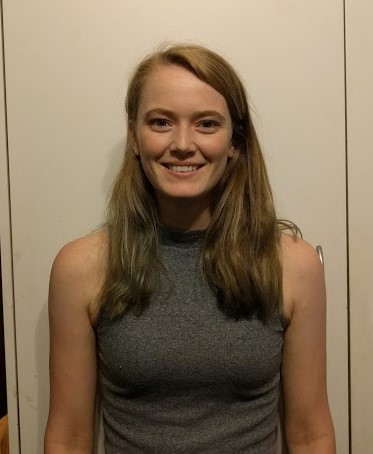
2020 Max Kelly Award Honourable Mention – Robbie Wardhaugh
for ‘Not Just A Phase: A Queer History Of Newcastle’, a portable exhibition in the form of a Zine.
Not Just A Phase: A Queer History Of Newcastle is a portable exhibition in the form of a zine. It was designed to provide an overview of queer history in Newcastle as well as a contextual background to the online archive of Hunter Rainbow History (HRH). HRH is a community-run LGBTQIA+ group started in 2016 to record and collect the stories of queer folk in the Newcastle and Hunter region. This project was created with the aim of addressing the alienation of young LGBTQIA+ folk from their history- a particularly pressing issue for regional centres and rural Australia. The zine was made during Semester 2, 2019 (August-November) of his Undergraduate degree at the University of Sydney. It formed part of the assessments for HSTY3902: History Beyond the Classroom and was made under the supervision of Michael McDonnell, Marama Whyte and John Witte. John Witte is a founding member of Hunter Rainbow History – the group the zine was made for.
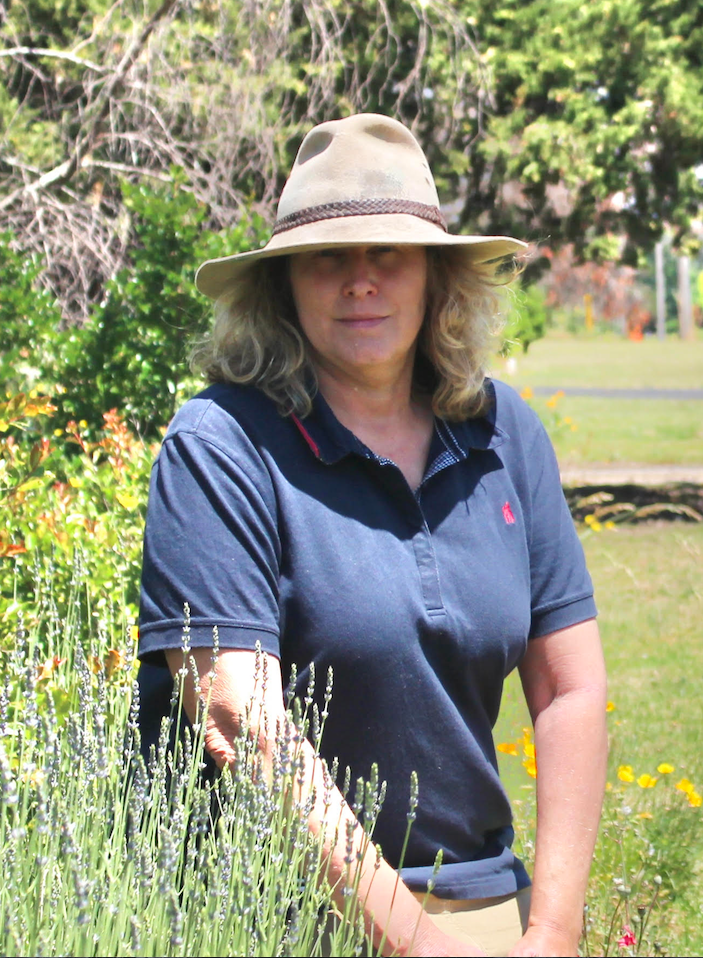
2020 Aboriginal History Prize Honourable Mention – Cate Hayton
for her essay ‘The Indigenous Servicemen of Walhallow. Lest we forget. Will we remember them?‘.
In 1934 the Gate of Memory First World War memorial was unveiled on the Walhallow Aboriginal Station, to commemorate the Indigenous servicemen of the area that served. On the school wall, a Honour Roll was placed, listing the 18 enlistees of the A.I.F. The Honour Roll has been missing for over 50 years. This research project was to recover the names of those servicemen, and the eight men that gave the supreme sacrifice. Using Indigenous voices with the utmost respect, this essay will trace the stories and experiences of these men to argue that the memorial was constructed as a political form of resistance at a time when Indigenous servicemen were not recognised on local war memorials. Private research and writing that continued after an initial undergraduate project at Macquarie University, Department of History, ANZAC: Australians at War in semester 3 2019. Over the following 18 months, she set out to recover the names of the servicemen with the aim to have the Roll of Honour returned to the Walhallow Public School and to have the men’s names added to the local war memorials.
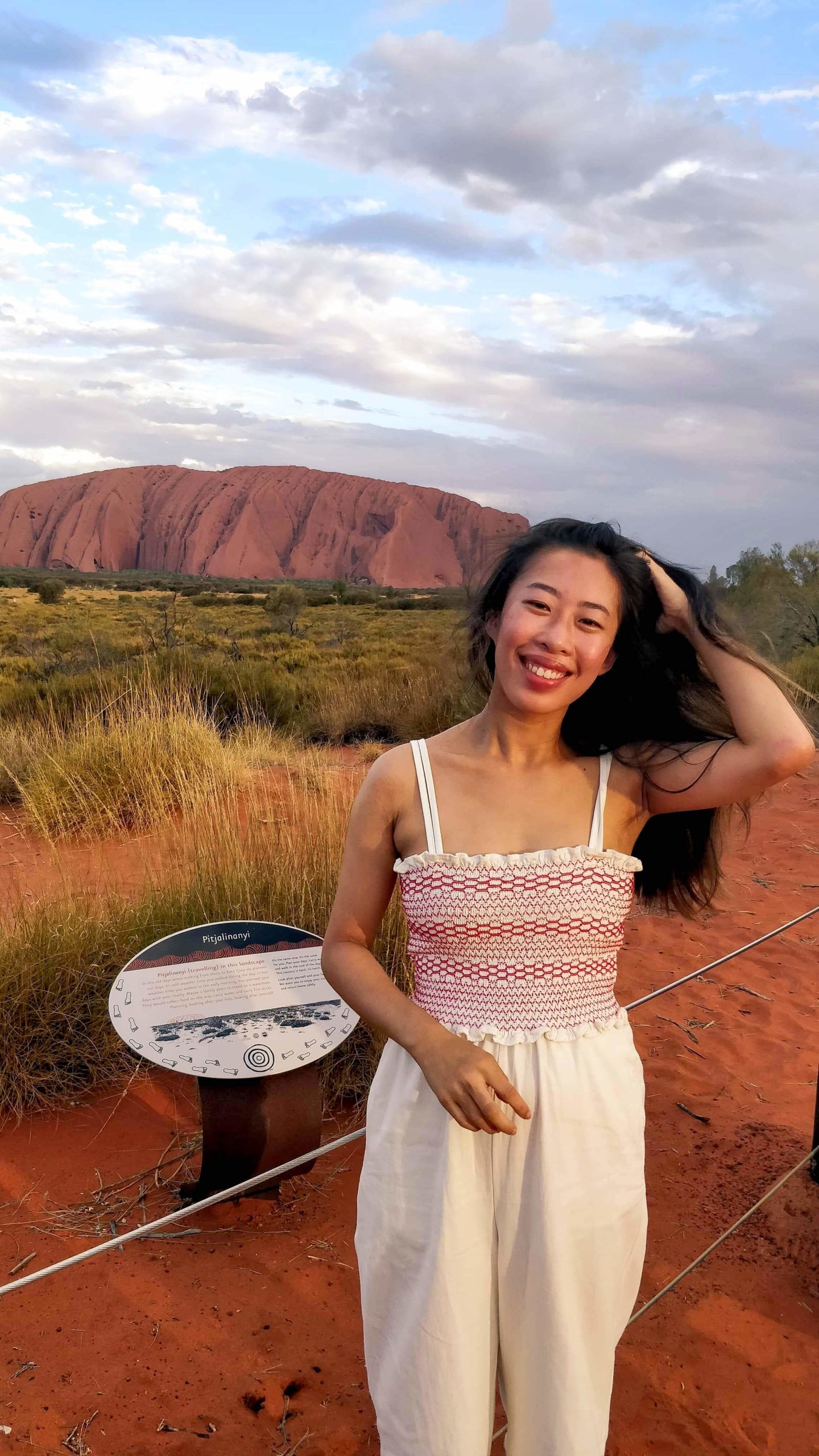
2020 Macquarie-PHA Applied History Award Honourable Mention – Lucy Yin Yin Luo
for her audio feature ‘The story of a young Fijian-Indian girl, an Aboriginal Australian activist and White Australia‘.
In 1965, the Menzies government was heavily criticised by domestic and international critics for its plans to deport six-year-old Fijian-Indian girl, Nancy Prasad. Media covered Prasad’s ‘abduction’ from Sydney airport in 1965 and her family’s many attempts to re-enter Australia as citizens. It’s believed officials were interested in liberalising non-European immigration policy within a controlled environment and only wanted to permit the most socially accepted people. Officials believed a precedent would only encourage other ‘culturally unassimilable’ people to apply. After Gough Whitlam’s government abolished the White Australia Policy, Nancy was welcomed into the country in 1976. This work was originally written as an undergraduate essay for a 300 level Australian history subject last year. It was an essay submitted to the University of Wollongong, subject HIST351 – Australian History: Moments that Matter, in the Autumn session (Semester 1) with Georgine Clarsen as her lecturer and tutor. It was submitted in late March and now has been re-written and edited as an audio feature piece without the help of Clarsen. Gwenda Tavan was interviewed by Lucy and voice actors were used in the introduction and news montages.
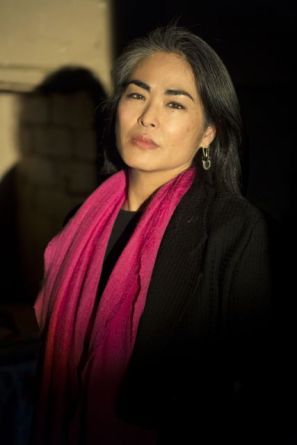
2020 Macquarie-PHA Applied History Award Honourable Mention – Masako Fukui, in collaboration with Cowra Council
for their Geolocative Storytelling App ‘Cowra Voices‘.
Cowra Voices is a geolocative storytelling app, documenting the unique peace and reconciliation story of Cowra. Cowra Voices attempts to harness the the intimacy of audio storytelling to share these stories. The Project Team has had a long-standing collaborative relationship with the Cowra community, having worked together on historical research projects, arts and cultural programs. From inception until completion, the Team worked closely with community members, Cowra Tourism, Cowra Council (copyright holder of the app), as well as the Wiradjuri people, the traditional custodians of the land. Other aims of the project were to explore new narrative connections between Australia and Japan. To this end, Japanese university students visited Cowra on a study tour in 2018, and contributed design ideas for the app. Interview recordings, sound design, app development and testing were all completed between January and July, 2019.
Masako Fukui is an independent writer, award winning audio producer, and bilingual journalist. She is a regular contributor to ABC Radio National. She has been a print journalist for major international news organisations including The New York Times, Nihon Keizai Shimbun (Nikkei), and NHK, Japan’s public broadcaster. She was the audio producer on the Cowra Voices project, a geolocative, audio storytelling app that tells the unique peace and reconciliation story of Cowra. She was born in New Delhi to Japanese parents and now lives in Sydney.
Annual History Citation
Each year the History Council of NSW, via nominations from General Council members, awards the Annual History Citation to an eminent historian to honour a lifetime of service to history.
The Citation recognises individuals for outstanding research and scholarship and acknowledges their broader contribution through teaching, leadership, mentoring and community involvement.
Recipients
- 2020 Professor Paul Aston: In recognition of his outstanding contribution to the study of Australian history and the international practice of public history.
- 2019 Max Solling: In recognition of his outstanding contribution to the study and practice of urban social history.
- 2018 Lyndall Ryan: In recognition of her research and teaching in women’s and Indigenous history, and her service to the profession in contributing to the development of Australian Studies and Women’s Studies.
- 2017 David Carment: In recognition of his outstanding contributions to historical scholarship, and his generosity and unwavering commitment to supporting the history community, including mentoring its emerging professionals.
- 2016 Carol Liston: In recognition of her contributions to researching and teaching history and heritage, and her service to the community and local history organisations.
- 2015 Alan Atkinson: In recognition of his outstanding contributions as a historian to teaching, scholarship and the community.
- 2014 Shirley Fitzgerald: In recognition of her outstanding contributions as a historian to teaching, scholarship and the community.
- 2013 Ann Curthoys: In recognition of her outstanding contributions as a historian to teaching, scholarship and the community.
- 2012 Ros Pesman: In recognition of her outstanding contributions as a historian to teaching, scholarship and the community.
- 2011 Beverley Kingston: In recognition of her outstanding contributions as a historian to teaching, scholarship and the community.
- 2010 Kate Cameron: In recognition of her outstanding contribution to the teaching and learning of History.
- 2009 Bruce Pennay: In recognition of his contribution to history as a historian and practising heritage consultant, in particular his service to heritage and community history in regional New South Wales and Victoria.
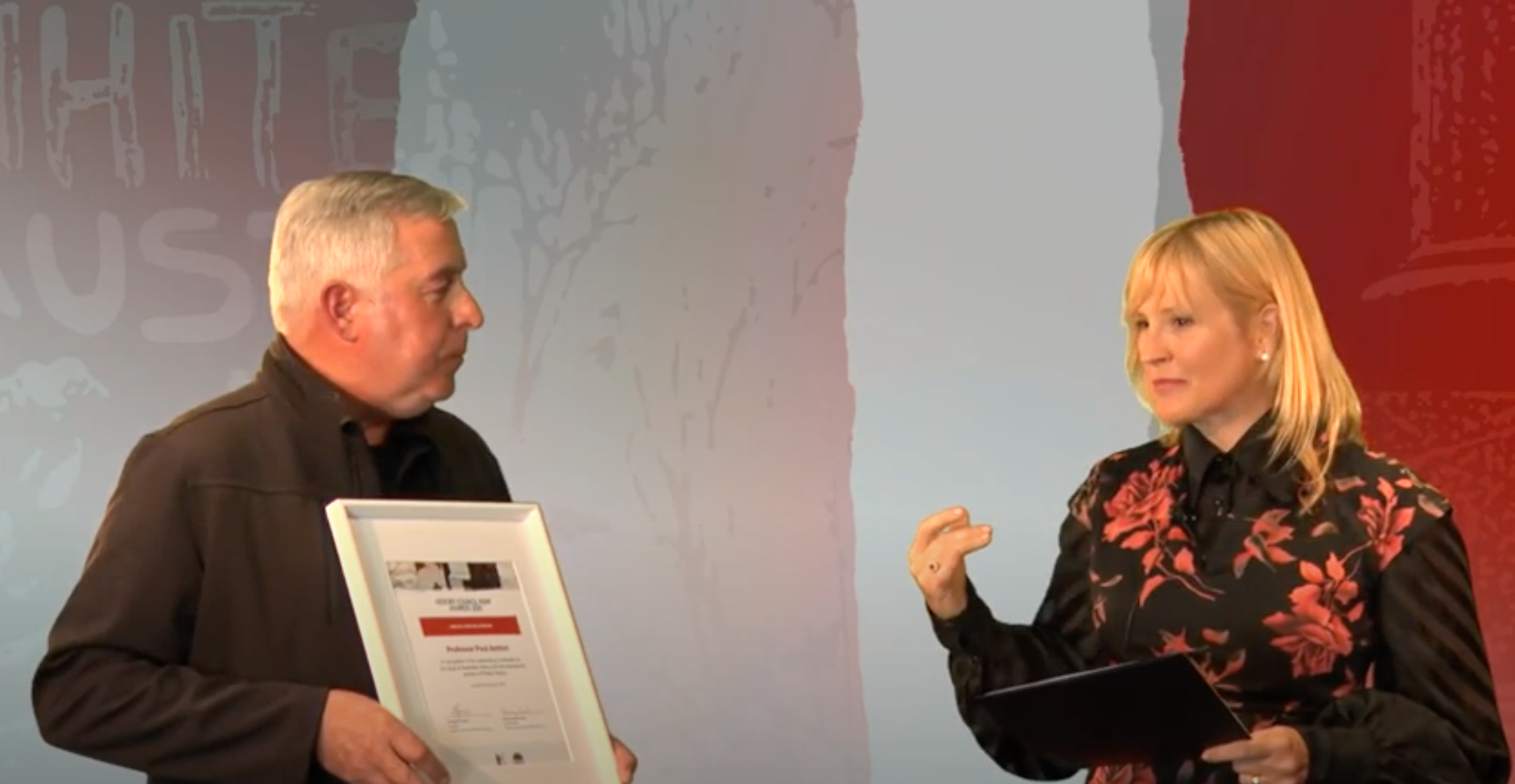
Dr Kiera Lindsey awarding Professor Paul Ashton the Annual History Citation – Winner of the 2020 Annual History Citation.
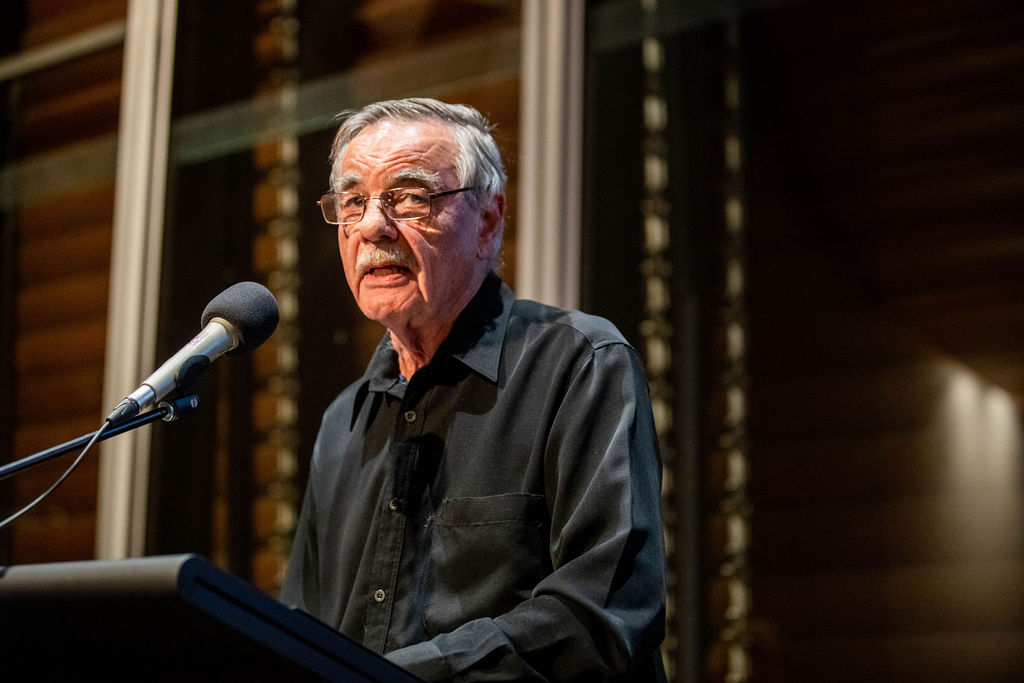
Mr Max Solling – Winner of the 2019 Annual History Citation. Photo credit: TWH Photography
- 2008 Baiba Berzins: In recognition of her significant contributions to the professional practice and interpretation of Australian history.
- 2007 Brian Fletcher: In recognition of his outstanding and lifelong contribution to the study and teaching of Australian history.
- 2006 Malcolm Sainty & Keith Johnson: For outstanding achievement and contribution to history and genealogy in Australia for over forty years.
- 2005 Bruce Mansfield: For his achievements as an outstanding teacher and scholar of history in Australia for over fifty years.
- 2004 Patricia Grimshaw: For her outstanding and lifelong contribution to the profession and practice of history.
- 2003 Terry Irving: For his contribution to the study of labour and political history in Australia.
- 2002 Clem Lloyd: For his role in fostering interdisciplinary approaches to Australian scholarship, and for his contribution to enhancing historical understandings of the Australian media, politics and public policy.
- 2001 Heather Radi: For her devotion to Australian history not only as a scholar but also as an organiser of ideas and events and a supporter of younger scholars.
- 2000 Bede Nairn: For his contribution to Australian Labour history.
- 1999 Gavin Souter: For his contribution to the writing of Australian history across a diverse range of subject matter.
- 1998 Faith Bandler: For her role in making and documenting the history of reconciliation, her contribution to the writing of indigenous history and enhancement of Australian historical understanding.
- 1997 Justice Rae Else Mitchell: For his encouragement of the practice of history in the community and his contribution to the vitality of history institutions.
Create NSW Funding & Support
The HCNSW is supported by an annual grant from Create NSW through the Arts & Cultural Development Program which enables it to manage the Awards & Prizes program, among other History Professional Development programs.
Information about funding and support available about this program can be accessed here.
Contact Us
